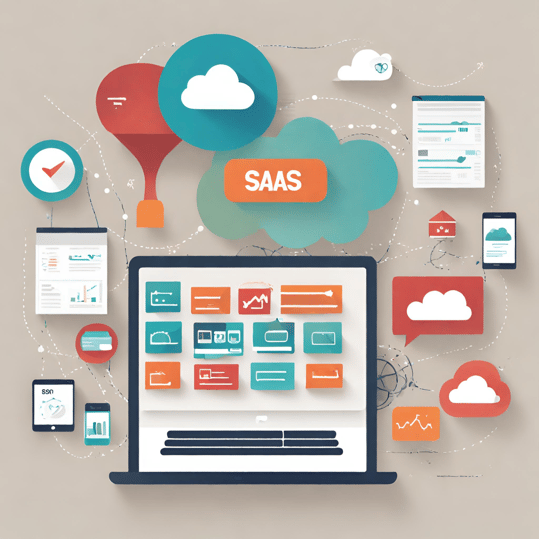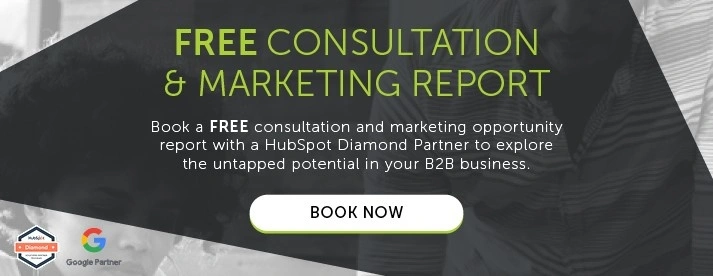Time is Money: SEO Efficiency for SaaS and Tech

In today’s dynamic and fast-paced world, it’s harder than ever before for companies to stand out from the crowd - and if that wasn’t bad enough, it’s even harder for SaaS businesses to get noticed (sorry).
With B2B SaaS companies all competing for the attention of a highly specific and pretty limited audience, the stakes are high - which is why if you’re going to get ahead, you need an efficient SEO strategy that works hard for you.
With dwindling budgets and demanding targets, we appreciate that seems pretty difficult to nail down - but the good news is that SEO for SaaS doesn’t need to be hard.
So, if you’re ready to outrank your rivals and want to make SEO a powerful part of your SaaS marketing strategy, read on to find out how to make your SaaS SEO as efficient as possible.
What is SEO for SaaS?
To put it simply, SEO for SaaS is the process of using SEO strategy to increase the traffic to your SaaS website by creating content that ranks on search engine results pages (SERPs) for searches your target audience is making.
Done right, SaaS SEO is a powerful marketing tool that can help you save money, increase visibility, and smash your targets - and considering 75% of people never scroll past the first page of search engines, it’s pretty important to get it right.
Basically, if you nail your SaaS SEO, you can:
- Reach people searching for your software
- Reach people searching for related software
- Reach people who want to learn about software
- Reach people who want to purchase software
Sound good? If you’re ready to start kicking butt at SEO for SaaS and turn your web traffic into a robust sales pipeline, let’s dive in.
8 ways to ensure your SaaS SEO is as efficient as possible
1. Identify your buyer personas
First things first, when it comes to smashing your SaaS SEO, it’s important to remember that your SEO strategy isn’t catering to just one person.
In fact, you’re probably dealing with everyone from C-suite execs to managers and even technical specialists too - and you need to make your SEO strategy appeals to them all.
With so many people influencing the buying decision, you need to identify your personas, home in on the keywords that each of these personas might use, and make sure your strategy is tailored to their needs.
Struggling to nail down your personas? We’ve got you covered. Discover our top tips on how to create buyer personas in this blog.

2. Conduct advanced keyword research
Next up, if your SEO strategy is going to be as efficient as possible, you need to make sure you nail your keyword research.
Keywords are the building blocks of SEO, which is why it’s so important to identify keywords that are relevant to your niche.
However, with SaaS keyword research, you need to go one step further and consider individual keywords, user intent, and the intricate SaaS sales cycle too.
With that in mind, key things to consider when conducting your B2B SaaS keyword research include:
Use the tools available
When conducting your keyword research, make sure you use tools such as Google Keyword Planner, SEMrush, or Ahrefs to compile a thorough list of keywords. You should also look at your competitors’ websites and analyse their keywords to see what terms they are ranking for too.
Look at search intent
If you’re going to nail your keyword research, you need to identify search intent. It’s no secret that SaaS customers conduct a lot of research before making a purchase, so make sure you group your keywords into research, comparison, and purchase.
Categorise your keywords
Next up, you should aim to divide your keywords into categories based on your buyer personas, search intent, and stage of the funnel. This information will give you the insight you need to create targeted content strategies.
Conduct competitor analysis
Once you’ve categorised your keywords, you then need to look back at the competition. Check out the domain authority of each website and evaluate how hard it would be to rank for each of the terms.
Prioritise your keywords
You should then begin to prioritise your keywords based on relevance, search volume, and difficulty. When it comes to choosing keywords, the best ones will have high relevance, high search volume, and low competition.
Problem solution mapping
B2B SaaS products are designed to solve complex problems. By using keyword research to identify your target audience’s problems and challenges, you can then map these to solution-orientated keywords to ensure your content is as relevant as possible.
Look at long-tail keywords
It’s no secret that in the SaaS market, competition for keywords is fierce. To get the most out of your SEO, look at long-tail keywords which can be easier to rank for and are more likely to attract highly qualified leads.
3. Craft high quality content
We’ve all heard the saying “content is king.” Well, in the B2B SaaS ecosystem, it’s more than that. In fact, B2B SaaS content influences everything, from visibility to credibility and engagement to conversions.
If you want to make sure your SaaS SEO is working hard for you, you need to create high-quality content centred around a core pillar topic that answers questions, solves problems, and serves the intent of all the different stakeholders involved in the B2B buying process.
We know time is money. After all, that’s what we called this blog! But trust us when we say that investing time producing informative blog posts, whitepapers, case studies, webinars, and infographics that resonate with your audience is a sure-fire way to provide valuable information to your target audience.
Not only that, but by acting as an authority on a particular subject matter, you can show search engines that you are an expert in the subject, which will be rewarded in terms of search rankings. Learn more about the topic cluster model and how it can help you boost your SaaS B2B SEO here.
4. Nail your on-page SEO
We can’t stress enough how important on-page optimisation is for SEO success.
Firstly, it has a direct influence on your search engine visibility. Secondly, it also impacts user experience and engagement, and thirdly, effective on-page SEO can guide stakeholders through the B2B sales funnel, ultimately helping to drive conversions.
Yes, you want your SEO to be as efficient as possible - but if you don’t cover the basics, you’re going to waste a significant amount of time and money in the long run.
Key things to think about to make sure you smash your on-page SEO include:
- Add your chosen keyword to the title tag
- Use heading tags - H1 for the main blog title, H2 for subtitles, and H3 for listed items to give search engines clues about the structure of your content
- Write a meta description including the keyword. This should be no more than 155 characters
- Include keywords throughout your content to help Google understand the topic
- Use terms and phrases related to your primary keywords to build context
- Include internal links to other pages on your website so Google can understand the structure of your site and give it a higher domain authority
- Link out to external relevant, trustworthy websites
5. Give your website a health check
The technical side of SaaS SEO involves ensuring your website is as search engine friendly as possible. Essentially, it’s about adding structure to your site so it’s easier for search engines to crawl.
By checking your website and fixing any errors, you can improve your site health which will lead to higher rankings on SERPs.
SaaS SEO tools such as SEMrush and Google Search Console can help you check for errors, but other key things to look for include:
- Check your internal and external links are working
- Use title tags, header tags, and meta descriptions on every page, and ensure they are not duplicated
- Check for site speed issues
- Check for toxic backlinks
- Make sure URLs have keywords
- Ensure meta descriptions include keywords and are around 155 characters
- Make sure images have ALT text describing them
- Check the site for duplicate content
- Check for content that is too short or too long
6. Boost your backlinks
Look, we know we said above that content is king. And it is. But if you’re going to get the most out of your content and your SaaS SEO is going to be as efficient as possible, you need to build a strong backlink profile to support it, too.
Basically, you could have the most SEO-optimised website with the most helpful and insightful content out there, but if you don’t receive “votes” from other sites, Google won’t give a stuff. She’s a cruel mistress, we know.
Backlinks are the most effective way to build authority and climb the rankings, so make sure you seek ample opportunities to have your content linked by reputable websites in the SaaS industry.
Guest posting, influencer outreach, and creating high-quality, sharable content are all effective ways to earn backlinks. Learn more about how to boost your backlinks in this blog.
7. Measure success and optimise for conversions
No SaaS SEO strategy is complete without tracking and analysing its performance over time, which is why you need to keep a close eye on your SaaS SEO performance and optimise it accordingly.
By tracking key metrics such as organic traffic, keyword rankings, bounce rates, and conversion rates, you can get an understanding of how well your SaaS SEO is performing and identify any potential issues or bottlenecks that might be holding you back.
Then, you can make the necessary improvements and refine your SEO strategy as needed to ensure you stay ahead of the game.
8. Evolve over time
Finally, it’s super important to understand that SEO is a dynamic, ever-changing field that evolves all the time. It’s not something you’ll just do once and will work forevermore (sorry), and what works today might not yield the same results tomorrow - which is why it’s so important to stay up to date with industry trends, algorithm changes, and best practices.
If you’re struggling to keep up with your SaaS SEO, it’s often easier and more cost-effective to hire an SaaS marketing agency to take care of your SEO efforts and ensure your SEO strategy is fresh and effective, so you can rest assured you are consistently at the top of your SEO game.
Your journey to SEO mastery begins here
For further advice on all things SaaS SEO, look no further than Angelfish. We’ve been navigating the complex waters of SaaS marketing for years and understand the long sales cycles, niche markets, and intricate buying processes involved with B2B SaaS marketing.
So, if you’d like to find out more about how our team of seasoned SEO pros can help you stay ahead of the curve, contact us today to start your journey to SaaS SEO success. Alternatively, check out our FREE guide to SaaS search mastery to get started right away.

Ready to Unlock AI SEO for Your Business?
AI SEO isn’t coming — it’s already here. Capture high-intent traffic and build sustainable pipeline growth.
Get Your Free Audit


